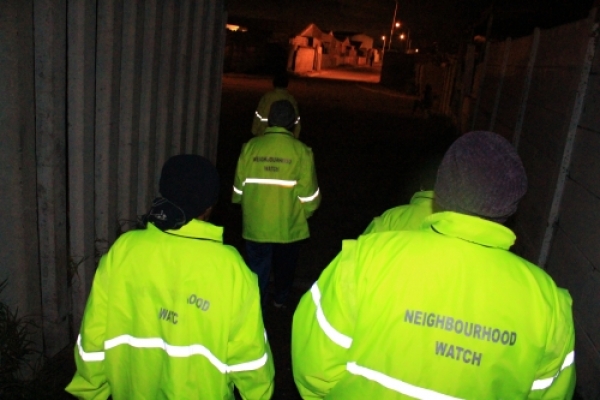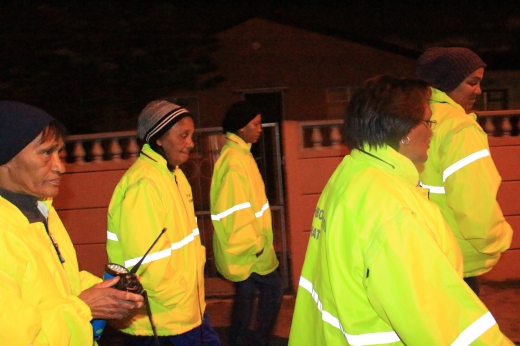How a group of Cape Flats women is trying to make their community safer

During the day, a group of six women from the Retreat area enjoy beadwork, looking after their grandchildren and helping the aged, but at night, they take on the streets in one of the most notorious gang-ridden areas of the Cape Flats.
They have become the only known all-women crime fighting squad in the Western Cape.
Armed with nothing more than reflective jackets and torches, the six women – the youngest, 29, the oldest, a 64-year-old great grandmother – make up the Seawinds Neighbourhood Watch.
“It takes a lot of guts and you can’t be scared. We come across so much during our patrols – gangsters, drug addicts and young people on the streets. They respect us if we respect them,” says Valme Holland, chairperson of the Seawinds Neighbourhood Watch.
The streets they patrol are strewn with rubbish, and outside spaza shops, children can be found at all hours playing umdovolo, a form of gambling. And there’s also the Funky Junkies, the dominant gang in the area.
Holland, a 54-year-old mother of two, joined the group in 2006, after a request by the previous chairperson and founder, Rita Jacobs.
“We started off having meetings in her house. In 2009, Helen Zille donated the two containers we now use as our offices. Dan Plato also gave us four bicycles.”
“They broke into the containers three times and they stole all our equipment, including the things we confiscated on previous searches,” she says.
The group now patrols on foot. They bring along their own torches as their sponsored bicycles and torches were stolen.
Four years ago, Jacobs left the group after her son was murdered by suspected gang members, following several death threats made to Jacobs and her family. “We started with 32 volunteers, but we are only six ladies left.”
Two years ago, Holland’s eldest son was stabbed to death while withdrawing money from an ATM in Kuils River. “I was so sad and angry, because I know he wasn’t a gangster … that’s why I go on the streets to counsel the young people not to do these things. I’m so protective over my two daughters, because I see so many things on the streets,” she says. Her daughters are aged 12 and 20.
Holland says her family often worries about her safety.
“Sometimes my husband isn’t happy, but I tell him this is my passion and I love to do it for the community, because I also have children. I must patrol to keep our streets clean. My children always ask if I’m safe on the streets,” she says.

Gloria Jeftha, Lisa Smith, Margareth Barron, Valme Holland and Meagan Jacobs patrol Seawinds on Friday night, 26 September 2014. Photo by Masixole Feni.
The group conducts patrols on Friday and Saturday nights from 10pm until 3am. “Before we go out for the night, we start with a prayer.”
Every Friday they take a different route and patrol Seawinds, Hill View, Overcome, and sometimes Montagu Village. The group’s members live in these areas.
“We can’t walk far, so we usually patrol one area then go back to the container at midnight, have a coffee, and then go to another area at 1am.”
They always try to patrol in a group of six.
“We take note of all the hotspots in the area and give the information to the police. Thankfully, none of us have been attacked or injured yet,” she says.
A few years ago, the group was accompanied by either a police van or the metro police, but this has since stopped.
“We radio Liz Meyer from the Muizenberg Neighbourhood Watch. If there are any problems then she can radio the police, because they don’t listen to us,” she explains.
Holland, who is known on the streets as “mumz”, says the group also uses the patrols as an opportunity to counsel the young people they come across.
“When we patrol we talk about everything and counsel the young people we find along the way. They listen to us … gangsterism and drugs, especially tik is very big here. Tik makes these people so aggressive,” she says.
They hope to soon complete a counselling course so that they can use their container to host counselling sessions during the day.
Asked if she thought the group had made an impact on combating crime and gangs in the area, Holland says it was difficult since they were a small group.
“We can only do so much, but doing something is better than just sitting at home and watching all this going on,” she says.
Holland and the other members burst into laughter when asked about the female-only team.
“Over the years, we’ve asked people to join us, especially the men. A man joined us last year. He patrolled with us one night and never pitched up the next night. I really don’t know what happened there,” she says.
The group recalled a close call during a patrol three years ago.
“We were walking late at night when we heard shots going off. A car came past us and someone started shooting from the car. We all ran into a yard and bent down on the ground until it was clear. Later, we found out that the guy had stolen the car, but police caught and arrested him that night.”
Most of the members have had short training stints as police reservists and in first aid work. “We recently went again for training with SAPS to freshen up our minds,” says Holland.
They have also adopted a seniors’ club called the “young ones”, which meets every Wednesday morning. Holland took over this initiative (spearheaded by Jacobs) at the same time as the Seawinds Neighbourhood Watch. “They do a lot of things: sewing, beading, knitting, baking bread… otherwise they sit at home and their grandchildren steal their money. So we are looking after them now.”
Holland said there had been times when they got into difficulties waiting for police to come to their aid.
As a result of the recent taxi violence in the area, the group had suspended their weekly patrols in recent weeks. They started again on Friday night, 26 September.
Frank Bokhurst of the Muizenberg Community Policing Forum says the group, which also belongs to a collective neighbourhood watches’ forum, often reports back on their dangerous circumstances during annual meetings.
“The police always tell us that neighbourhood watches are the backbone of police operations in the community. It’s difficult to assess the impact they have in the community, because criminals often just move somewhere else,” says Bokhurst.
Support independent journalism
Donate using Payfast

Don't miss out on the latest news
We respect your privacy, and promise we won't spam you.

This article is licensed under a Creative Commons Attribution-NoDerivatives 4.0 International License.
